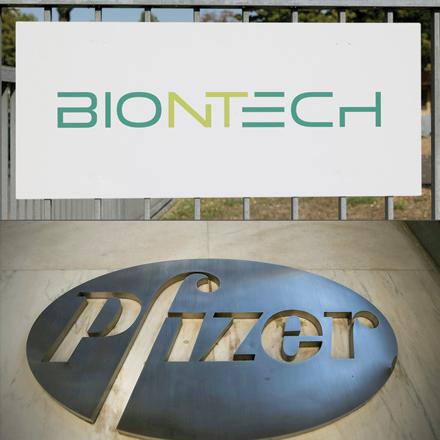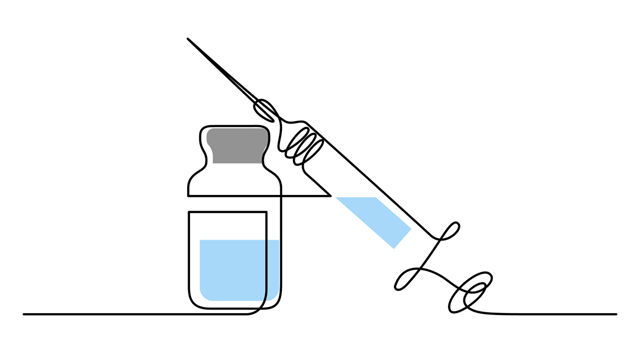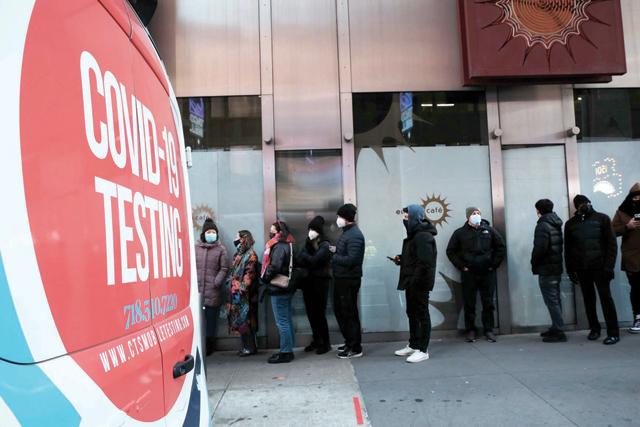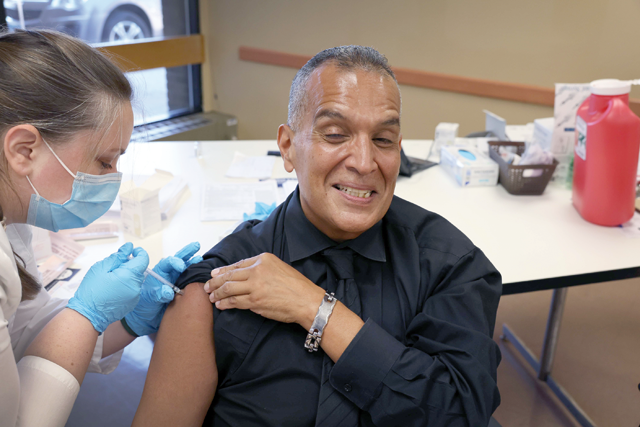You are here
Regulator to decide on Pfizer/BioNTech COVID-19 jab first
By AFP - Dec 01,2020 - Last updated at Dec 01,2020

This file combo photo created on November 9 shows the logo of German biopharmaceutical company BioNTech and the logo of US pharmaceutical company Pfizer (AFP photo)
FRANKFURT AM MAIN — Europe's medicines regulator said Tuesday it would decide by December 29 whether to grant emergency approval to a COVID-19 vaccine developed by Germany's BioNTech and its US partner Pfizer, ahead of a rival treatment from Moderna.
The European Medicines Agency (EMA) confirmed that it had received formal applications from both vaccine makers seeking the green light for their experimental jabs.
"If the data submitted are robust enough to conclude on the quality, safety and effectiveness of the vaccine," the Amsterdam-based agency said it could conclude its assessment of the BioNTech/Pfizer shot in an extraordinary meeting on December 29 "at the latest".
A separate meeting to assess the Moderna shot would take place on January 12 at the latest, it added.
Large-scale trial data released last month showed that both vaccines were safe and around 95 per cent effective against COVID-19.
European Commission spokesman Stefan de Keersmaecker told reporters that once the EMA had given regulatory permission, formal authorisation from Brussels would follow "very quickly", probably "in a matter of days".
Although both vaccines are being assessed in an accelerated process known as a "rolling review", the latest timeline suggests Europeans would be lucky to receive the first jabs before the year is over.
BioNTech/Pfizer and Moderna have also applied for emergency use authorisation in the United States, where Americans are expected to start getting vaccinated around mid-December.
UK regulators, who because of Brexit no longer have to wait for the EMA’s okay, are also in the process of considering emergency approval of the BioNTech/Pfizer vaccine.
‘Ready to ship’
BioNTech and Pfizer said they had asked the EMA for “conditional market approval” (CMA) of their vaccine on Monday, after filing a request for emergency authorisation in the US on November 20.
If approved by the EMA, the vaccine could potentially be rolled out “in Europe before the end of 2020”, the companies said in a statement.
“We have known since the beginning of this journey that patients are waiting, and we stand ready to ship COVID-19 vaccine doses as soon as potential authorisations will allow us,” Pfizer CEO Albert Bourla said.
A CMA can be granted “in emergency situations in response to public health threats”, the EMA says on its website.
Fellow vaccine frontrunner Moderna, a US biotech firm, meanwhile said it had sought emergency approval for its COVID-19 shot in both the US and Europe on Monday.
The BioNTech/Pfizer and Moderna vaccines have been developed at breathtaking speed as part of an unprecedented effort to end a pandemic that has killed more than 1.4 million people worldwide and devastated the global economy.
Both are based on a new technology that uses mRNA (messenger ribonucleic acid) to deliver genetic material to the body that makes human cells create a protein from the virus.
This trains the immune system to be ready to attack if it encounters the novel coronavirus.
No mRNA vaccines have ever been approved for widespread use.
Highly effective
As well as proving highly effective in preventing COVID-19, both vaccines were found to be consistent across all age-groups — a primary concern for a disease that hits the elderly the hardest — as well as genders and ethnicities.
But there are important differences between the two.
Moderna’s vaccine can be kept in long-term storage at -20ºC while Pfizer’s requires -70ºC.
On the other hand, the Pfizer/BioNTech doses are much smaller — 30 microgrammes to Moderna’s 100 microgrammes — probably lowering production costs per dose.
It remains unclear how long exactly protection against COVID-19 might last, and both vaccines will likely require a booster shot.
Pfizer and BioNTech have previously said they expect to manufacture up to 50 million doses of their vaccine globally this year, and up to 1.3 billion doses by the end of 2021.
Moderna has said it aims to have approximately 20 million doses of its vaccine, called mRNA-1273, available in the US by the end of the year.
It expects to manufacture 500 million to one billion doses globally next year.
According to the World Health Organisation, around 100 vaccine candidates are currently in development. Around a dozen of them are in the final phase three stage when the shot is tested on tens of thousands of volunteers.
A vaccine developed by AstraZeneca and Oxford University may be rolled out in the UK before the end of the year.
Related Articles
PARIS — France became the latest country on Tuesday to authorise new COVID-19 vaccines that have been updated to target Omicron subvariants
BRUSSELS — The European Commission on Monday authorised a vaccine from US company Novavax as its fifth official jab for use across the Europ
THE HAGUE — The EU’s medicines watchdog on Monday approved a vaccine specifically targeting the new and contagious types of the Omicron vari














